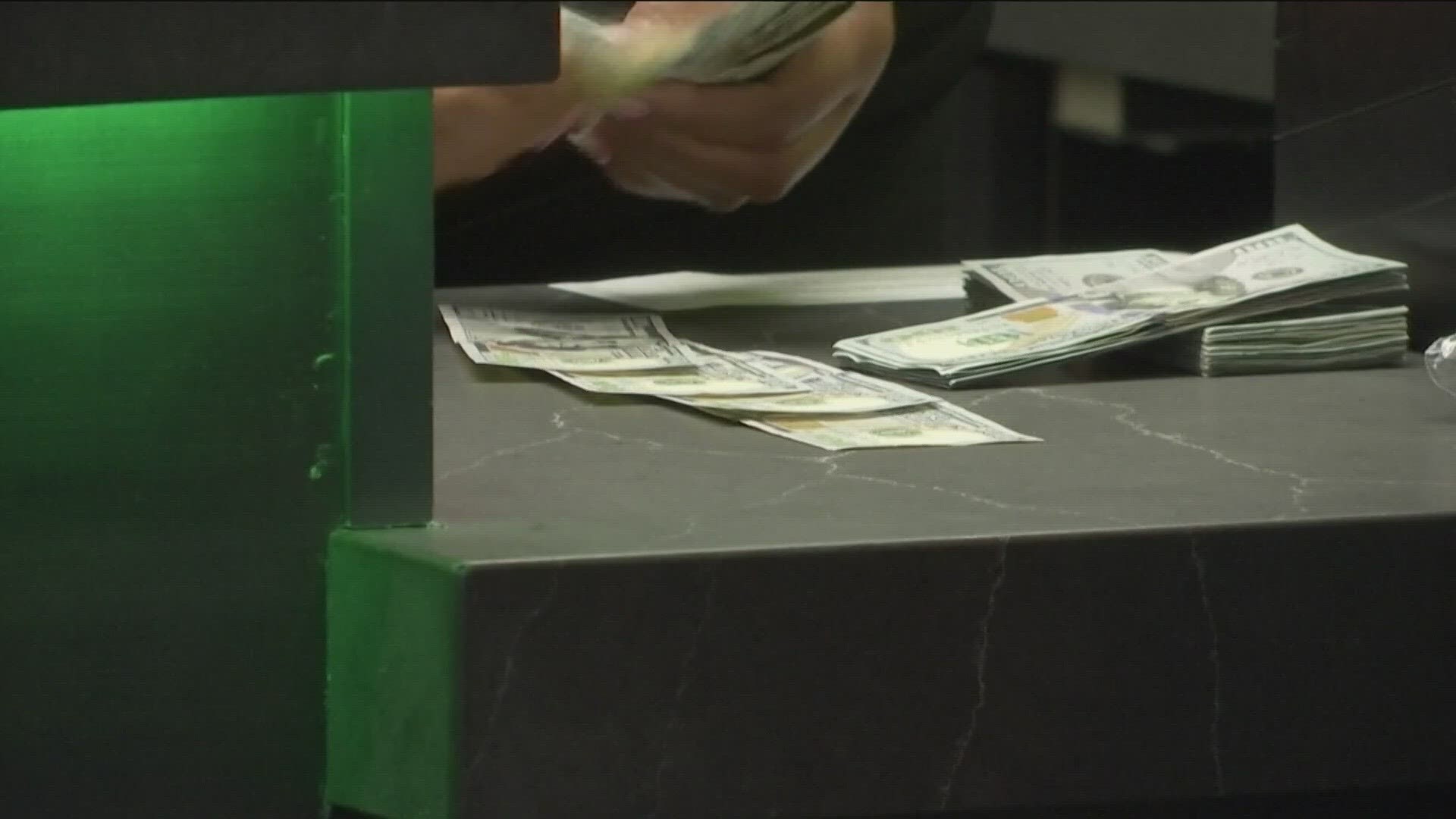ATLANTA — Georgia senators passed a bill to allow online sports gambling Thursday afternoon. However, a bill amendment was approved before the bill's passage that requires a state constitutional amendment.
The Senate voted 35-15 to pass Senate Bill 386, sending it to the House for more debate. But 34 senators went against the sponsor's wishes by attaching the requirement for the amendment in a separate vote. That would necessitate an additional constitutional amendment, which would need support from at least 38 senators.
Here's how your state senator voted on Thursday in the bill's passage:
Sen. John Kennedy (R-Macon) - Yes
Sen. Kennedy represents District 18, which includes Monroe, Peach, Crawford, and Upson Counties, along with western Bibb County.
Sen. David Lucas (D-Macon) - Yes
Sen. Lucas represents District 26, which includes eastern Bibb County, northern Houston County, along with Twiggs, Wilkinson, Hancock, Washington, and Johnson Counties.
Sen. Larry Walker III (R-Perry) - No
Sen. Walker represents District 20, which covers southern Houston County, along with Bleckley, Laurens, Dodge, Treutlen, Pulaski, Dooly, and Wilcox Counties.
Sen. Blake Tillery (R-Vidalia) - No
Sen. Tillery represents District 19, which includes Telfair, Wheeler, Montgomery, and Toombs Counties, among others.
Sen Rick Williams (R-Milledgeville) - Yes
Sen. Williams represents District 25, which covers Baldwin, Jones, Putnam, and Jasper Counties, among others.
Sen. Carden Summers (R-Cordele) - Yes
Sen. Summers represents District 13, which includes Crisp, Turner, and Ben Hill Counties, among others.
Sen. Ed Harbinson (D-Columbus) - Yes
Sen. Harbinson represents District 15, which includes Taylor and Macon Counties, among others.
--
Supporters of passing a bill without an amendment say sports betting can be authorized under the Georgia Lottery. Voters approved the lottery in a statewide referendum on a constitutional amendment in 1992.
Backers said the real question is whether Georgia should tax sports betting they say is already happening in the state. By making sports betting part of the Georgia lottery, they say those proceeds can add a hundred million dollars annually for pre-K and HOPE scholarships. That would mean that proceeds would be legally earmarked to prekindergarten classes and HOPE Scholarships for students who achieve at least a “B” average in high school.
Sen. Clint Dixon, a Buford Republican, said more money for both programs is “much needed,” saying sports betting could generate $100 million or more in state tax revenue each year. Dixon's bill would also require the lottery to gradually spend down a substantial part of its $2 billion in reserves, which would further increase funding.
But many who voted for the bill also supported the constitutional amendment, which would allow the proceeds of sports gambling to be directed to other purposes, such as need-based scholarships.
Democrats, in particular, have pushed for need-based scholarships. Their backing is key because some Republicans morally oppose gambling. Democrats have withheld their votes in past years, seeking to bargain over other issues.
Others support a constitutional amendment because they argue Georgia voters never intended sports betting to be included when they passed a lottery in 1992. Sen. Bill Cowsert, an Athens Republican, is a leading proponent of that stance. He called denying a statewide vote “sneaky” and suggested that a court challenge would defeat any law that passed without an accompanying constitutional amendment.
“My counsel would be don’t go spend this million dollars and start investing in this until you know this is constitutional," Cowsert said. "There will be plenty of challenges.”
Critics of the bill say state-sponsored gambling would increase gambling addiction, destroying families. They say legalization would encourage Georgians to gamble even more on sports than they already do illegally. Republican Marty Harbin (R-Tyrone) said it would damage college sports.
"College sports have a history of gambling. Where there’s gambling, there’s scandal. And we need to protect especially our colleges from that type of problem," Harbin told senators.
Critics also said the bill needed a constitutional amendment, which would allow voters to have the final say. An effort to pass a constitutional amendment flopped last year when it won 30 votes, a majority of senators but short of the 38 needed.
A different Senate committee earlier this session passed a bill that would require a constitutional amendment, but there’s been no further movement on that measure.
"To pass this bill without making it contingent upon the voters of this state being allowed to weigh in and approve it is disingenuous at best and just sneaky," state Sen. Bill Cowsert (R-Athens) told lawmakers.
The bill that passed Thursday would take 20% of proceeds in taxes after prizes are paid to gamblers. Nationwide, tax rates are set at anywhere from 6.75% in Iowa to 51% in Rhode Island and New York.
The measure would give one license directly to the Georgia Lottery. Another eight licenses would be given to pro sports interests in Georgia, including MLB's Atlanta Braves, the NFL's Atlanta Falcons, the NBA's Atlanta Hawks, the WNBA's Atlanta Dream, and Major League Soccer's Atlanta United. Other licenses would go to NASCAR's Atlanta Motor Speedway and golf's Augusta National and PGA.
The lottery would be in charge of distributing seven other licenses without ties to pro sports teams. Those licenses would require a $100,000 application fee and an annual license fee of $1 million.
It now goes to the House – which has bottled up sports betting bills in the past.

